-
이 대통령 "무슨 수 써서라도 성공"…야당·언론 비판도재생
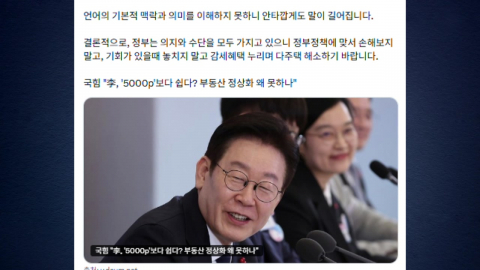
-
이재명 대통령이 주말 사이에도 SNS를 통해, 집값 상승세를 잡겠다는 의지를 거듭 드러냈습니다. 무슨 수를 써서라도 성공하겠다며, 야당의 지적과 언론의 우려를 강하게 비판하기도 했는데요. 취재기자 연결해 자세히 알아보겠습니다. 홍민기 기자, 이 대통령의 SNS 글 자세히 소개해주시죠. [기자] 네, 이 대통령은 어젯밤 11시 50분쯤, 자신의 X 계정에 글을 올렸습니다. 어제 ’부동산 정상화가 불가능할 것 같으냐, 계곡 정비나 코스피 5천 달성보다 훨씬 더 쉽고 중요하다’고 쓴 데 이어, 이를 부연 설명하는 내용을 재차 올린 겁니다. 해방 이후 한 번도 성공 못 했을 만큼 어려운 계곡 정비, 대부분 헛소리로 치부했던 주가 5천 포인트도 해냈다며, 집값 안정은 무슨 수를 써서라도 반드시 성공시킬 거라는 뜻이라고 설명했는데요. 정책 수단은 얼마든지 있지만 그동안은 정치적 유불리 때문에 최적의 수단을 쓰지 못한 게 사실이라며, 국민을 믿고 정치적 유불리에서 벗어나면 불가능한 일이 아니라고 강조했습니다. 이 대통령은 어제 자신의 말을 국민의힘이 ’망언’이라고 반박했다는 내용의 기사도 함께 공유하면서, 말 배우는 유치원생처럼 말을 제대로 못 알아듣는 분들이 있다고도 적었습니다. 부동산을 잡겠다는 자신감을 연일 강조하면서, 이에 대한 야당의 비판을 재차 반박한 건데요. 이 대통령은 기회가 있을 때 놓치지 말고 감세혜택을 누리며 다주택을 해소하길 바란다는 내용도 함께 적었습니다. 오는 5월 9일 끝나는 다주택자 양도소득세 중과 유예를 연장하지 않겠다는 뜻을 거듭 확인한 거로 해석됩니다. 오늘(1일) 아침엔 다주택 규제로 인한 부작용을 분석한 기사를 공유하고, 언론이라면서 대체 왜 이렇게 망국적 투기를 편드는 거냐고 강하게 비판하기도 했습니다. 부동산 투기로 인해 나라가 사라질 지경에 이르렀는데 세금 좀 부과한 것이 그렇게 부당한 거냐고 반문했는데요. 그러면서 정론직필은 못 하더라도 정부에 대한 ’억까’ 즉, 억지 비판은 자중해 주면 좋겠다고 덧붙였습니다. 이 대통령은 부동산 외에도 설탕 부담금 토론 제안, 일본군 위안부 피해자 모욕 단체 질타 등 이번 주말에만 7건의 SNS 글을 올렸습니다. 지금까지 청와대에서 전해드렸습니다. ※ ’당신의 제보가 뉴스가 됩니다’ [카카오톡] YTN 검색해 채널 추가 [전화] 02-398-8585 [메일] social@ytn.co.kr
-
대미투자법·개혁법안 속도전…’합당’·’제명’ 난맥상재생
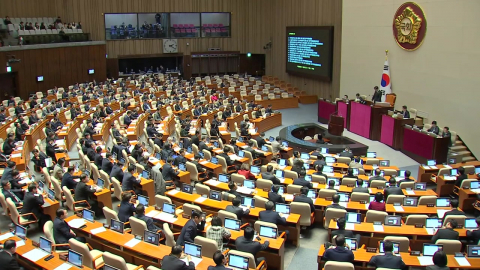
- 민주 "말싸움할 시간에 집 더 짓겠다…정쟁 멈춰야"
- 국힘 "대통령의 ’겁주기’로는 집값 못 잡아…배급형 주거 우려"
- 이 대통령 "설탕부담금, 토론·공론화해야…억지 왜곡은 사양"
-
아파트 가스 폭발에도 ’전쟁 공포’…대화 진전 속 긴장감재생

-
미국의 대이란 군사 작전이 임박했다는 관측 속에 이란 아파트에서 발생한 가스 폭발 사고로 사상자가 속출했습니다. 미군 공습은 아닌 것으로 확인된 가운데, 양측간 대화와 군사 충돌 가능성이 동시에 거론되고 있습니다. 권준기 기자입니다. [기자] 이란 남부 항구도시의 아파트에서 발생한 폭발 사고. 어린이 1명이 숨지는 등 10명 넘는 사상자가 나왔습니다. 트럼프 대통령의 위협이 계속된 가운데 일어난 폭발에 미군 공격설이 나왔지만, 조사 결과 내부 가스누출이 원인인 것으로 파악됐습니다. 압박 강도를 높이던 트럼프 대통령은 이란과의 협상에 무게를 실으며 분위기를 전환했습니다. "이란에 대한 향후 계획은 대화하는 것"이라고 폭스뉴스 인터뷰에서 말했습니다. 이란 당국도 "미국과의 협상을 위한 준비가 진전되고 있다"고 밝혀 극적 합의 가능성이 주목되고 있습니다. 하지만 협상이 좌초될 경우 군사적 충돌 우려는 여전합니다. 미국은 중동 지역으로 함대를 집결하고 대잠 초계기를 띄우며 언제든 공격이 가능하다는 신호를 보내고 있습니다. [도널드 트럼프 / 미국 대통령 : 자세한 건 말해줄 수 없지만 아주 크고 강력한 함대가 이란 방향으로 가고 있습니다.] 이란도 맞대응 준비가 완료됐다고 경고했습니다. [아미르 하타미 / 이란 육군 총사령관 : 그들(미국)의 사악한 의도를 알고 있기에 우리는 방아쇠에 손가락을 올려놓고 있습니다.] 이런 가운데 AP 통신은 이란이 지난해 공격 받은 핵시설을 복구할 움직임을 보이고 있다며 위성사진을 공개했습니다. 로이터통신은 이란이 지난해부터 전쟁 대비를 강화해 미국이 공격하면 전면전으로 번질 가능성이 크다고 분석했습니다. YTN 권준기 입니다. 영상편집 : 신수정 디자인:유영준 ※ ’당신의 제보가 뉴스가 됩니다’ [카카오톡] YTN 검색해 채널 추가 [전화] 02-398-8585 [메일] social@ytn.co.kr




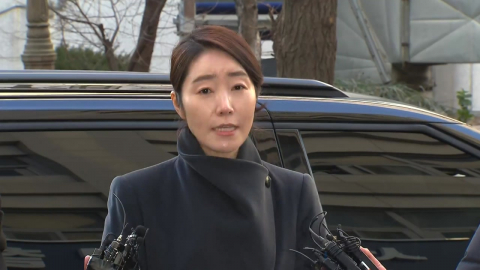
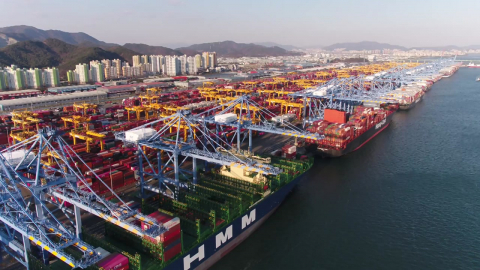



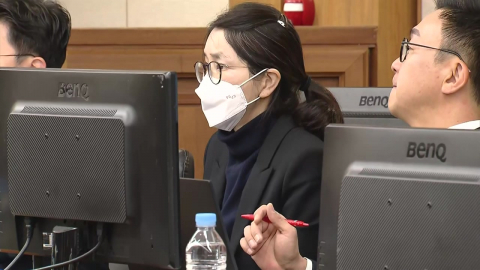





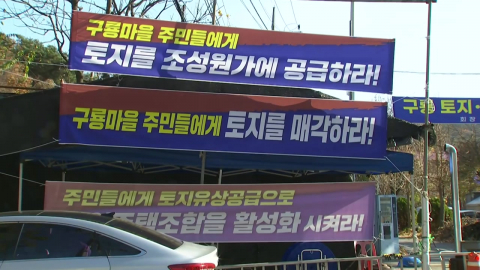

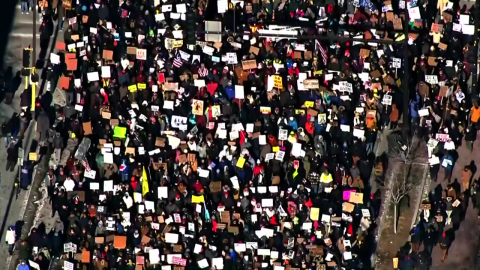




![[Y초점] 차은우·황정음·이하늬 등, 1인 기획사의 명과 암](https://image.ytn.co.kr/general/jpg/2026/0130/202601300900014373_h.jpg)






